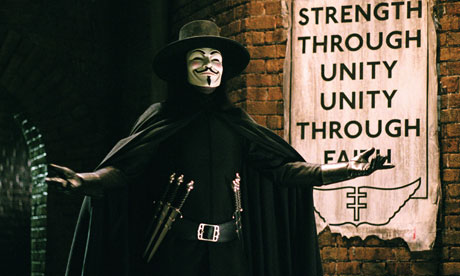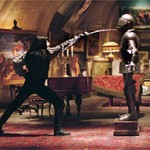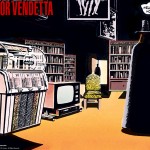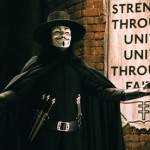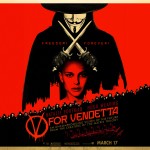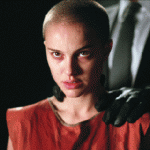“Remember, remember the fifth of November,
Gunpowder treason and plot.
We see no reason
Why gunpowder treason
Should ever be forgot!”
Thus begins V for Vendetta, a darkly iconic and allegorical comic book strip dating back to 1982, and, in 2006, a darkly satirical movie based on the self-same comic strip. It has shades of Nineteen Eighty-Four (ironically, John Hurt, who played Winston Smith in the movie version of Orwell‘s dystopian epic, resurfaces in V for Vendetta as Big Brother-esque de facto dictator, High Chancellor Adam Sutler), Brave New World and other very-near-future stories.
It is set in the context of an authoritarian and controlling British regime stamps down on freedom of expression and personal liberty. Curfews reign and Fingermen are there to finger you in any way they can. Thought police black bag those considered to be dangerous, though state television (BNT) provides the British public with sanitised versions of the truth – such as the “emergency demolition” of the Old Bailey, blown up by a common hero (or in government eyes, terrorist) in the form of a masked rebel known only as V.
V it is who inspires people to fight back on November 5th, the anniversary, you will recall, of the vain attempt by a conspiracy in 1605 to blow up the Houses of Parliament, celebrated ever since by burning the effigy of Guy Fawkes and letting off fireworks. His daring raids outfox the police, but his real revenge is to complete the work of the Gunpowder Plotters, culminating in the symbolic act that Fawkes once attempted.
The character, played beguilingly by Hugo Weaving as a latter-day knife-wielding Zorro of a philosopher adorned with a rictus-grinning Fawkesian mask, stays anonymous and is never exposed, though we know he was burned in a fire at the Larkhill Correctional Institute, where shady biological experiments were conducted before Sutler’s rise to power and a subsequent massacre blamed on the enemies of the regime. V exacts his revenge upon the government with impunity, believing violence to be justified in the face of the death of freedom.
Clearly Peter Bradshaw in the Guardian didn’t approve, though I would demur about many of his findings. Visually it’s a riot, and much more cohesive than Bradshaw would have you believe. Politically naive, maybe, but with an understated power politicians would do well to note. I’d agree that some of the more florid language of the cartoon, Shakesperian quotes notwithstanding, sound both stylised and over the top, but then that is quite deliberate and in-keeping with the source format. For example, want some alliteration? Start here:
“Voilà! In view, a humble vaudevillian veteran, cast vicariously as both victim and villain by the vicissitudes of Fate. This visage, no mere veneer of vanity, is a vestige of the vox populi, now vacant, vanished. However, this valorous visitation of a by-gone vexation, stands vivified and has vowed to vanquish these venal and virulent vermin vanguarding vice and vouchsafing the violently vicious and voracious violation of volition. The only verdict is vengeance; a vendetta, held as a votive, not in vain, for the value and veracity of such shall one day vindicate the vigilant and the virtuous. Verily, this vichyssoise of verbiage veers most verbose, so let me simply add that it’s my very good honor to meet you and you may call me V.”
But for all the verbiage, there are nuggets hidden away in the script, notably the rewriting of a Thomas Jefferson quote:
“People should not fear their government. Government should fear their people.”
How very true is that! But then V provides ample reason why the politicos in this drama should be scared, not least from some very nifty knife-throwing that would always earn him a place in the circus, when he wasn’t killing the common enemies of the people.
You’ll note a fine cast of British actors on hand to make the wheels turn smoothly. However, the excellent British cast his makes the presence of Natalie Portman with a coached “English accent” all the more puzzling. Bradshaw, in a neat turn of phrase, calls her “reliably terribly” though clearly she has some capability – notably when she doesn’t realise she in a clanger of a movie and try too hard to compensate (and let’s face it, Black Swan truly was a turkey.) So what’s her excuse here, I wonder? She might be the Hollywood B-lister sent out to headline the movie, but she is barely convincing, overacts and is performed off the screen by those around her. Sorry Natalie, but here you are well and truly floundering.
The principle demagogue against whom V initially pits his wits is Lewis Prothero (the splendid Roger Allam), black-shirt and “Voice of London.” But Prothero proves to be all mouth and no substance; the real danger is head of the secret police, Tim Pigott-Smith‘s silent but deadly Creedy.
Against this backdrop, holding Creedy at bay, is the phlegmatic and reflective Finch (Stephen Rea), the inspector responsible for investigating V’s terrorist crimes – for one man’s freedom fighter is always another man’s terrorist. His crimes are to kill with slashes of arterial spray those who support the regime, but in spite of a claimed conscience he also imprisons Evey (Portman), whom he has rescued and who at one point saves him, in order to demonstrate the freedoms we take for granted.
Even Stephen Fry gets in on the act as a closeted TV presenter – and ultimately meeting a sticky end. Like many roles Fry plays, the character seems very like, well, Stephen Fry, actually, but none the worse for that. Look out for Rupert Graves, Sinead Cusack, John Standing and many more excellent character actors.
In that context, the debate within V for Vendetta is totally up to the minute. It reflects the instinct of all governments to cap freedom and human rights, to govern in secret and restrict true democracy. But if the people truly do act collectively, any government and its secret police can be vanquished. In this political allegory, you would expect freedom and liberty to triumph over secrecy and the autocratic finger of power, but what of real life? Are we sleepwalking into a controlled state of affairs? Many would argue V has it spot on, though the posthumous victory V achieves is seldom anyone could manage in real life.
That aside, how well does VfV translate from the comic book though? Pretty well, I’d say – and quite faithfully too: the same palette of strong primary characters, characters who look and sound how you would expect them to look and sound, excellent accompanying music, and the full use of London as a backdrop against which the magnificent confrontation is staged (though all the interiors and the miniature shots and pyrotechnics were actually filmed in Berlin.)
If you expect anything other than a sophisticated cartoon, you may well be disappointed – but V is what V is, and that ain’t half bad as a way of spending 132 minutes of your life. A word for the production design team, who have done an amazing job in recreating London and some wonderful interiors through the movie. And of course the special effects team too for the explosions!
However, there is a development of the political aspect into something more three-dimensional, though the parallels are never far from the surface. However, it does pose a very real question: would the British people ever rise up in rebellion against the government, other than short-lived riots? Could we be woken from our stupor and display the true face of democracy instead of our usual apathy? Some think we could, but it will take more than a V to bring about real change (or will it? See here.)
But then, you don’t have to take the political stuff if you don’t want – just enjoy the action!

